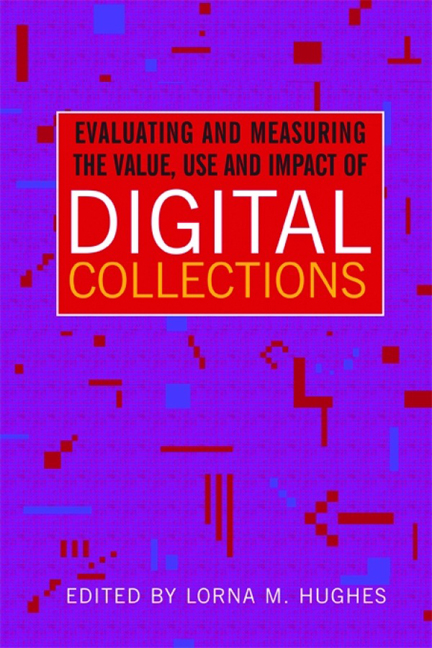Book contents
- Frontmatter
- Contents
- Figures and tables
- Foreword
- Acknowledgements
- The contributors
- 1 Introduction: the value, use and impact of digital collections
- Part 1 Digital transformations in libraries, museums and archives
- Part 2 Understanding and measuring the use, impact and value of digital collections
- Part 3 Enhancing the future impact and value of digital collections
- References and further reading
- Index
- Miscellaneous Endmatter
- Miscellaneous Endmatter
1 - Introduction: the value, use and impact of digital collections
Published online by Cambridge University Press: 08 June 2018
- Frontmatter
- Contents
- Figures and tables
- Foreword
- Acknowledgements
- The contributors
- 1 Introduction: the value, use and impact of digital collections
- Part 1 Digital transformations in libraries, museums and archives
- Part 2 Understanding and measuring the use, impact and value of digital collections
- Part 3 Enhancing the future impact and value of digital collections
- References and further reading
- Index
- Miscellaneous Endmatter
- Miscellaneous Endmatter
Summary
Background and context
The aims of this volume
A key motivation for developing this volume was the need to address the ‘use’, ‘value’ and ‘impact’ of digital collections in the context of an expanding mass of digital content with tremendous potential. Specifically:
• How can we understand how digital collections are being used, and by whom?
• How do we assess their value, and add value over time, in order to make decisions about which collections to digitize or make available, and how?
• How do we assess their impact on scholarship, on knowledge transfer and on information management and access?
• How do we ‘measure’ value? What can be measured, and how?
• Is it possible to ensure their sustainability, value and impact over time?
• How might we apply indicators of use, value and impact to inform funding decisions and policy making for the future?
The explosion of digital initiatives
This volume of essays is, in many respects, a follow up and companion to Digitizing Collections: strategic issues for the information manager (Hughes, 2004). Since its publication, digitization initiatives have continued at a tremendous pace in libraries, archives and museums, as well as in higher education. Digitization of existing library, museum and archive collections is still a major priority, where funding can still be found for these initiatives. The National Library of Wales is continuing to digitize two million pages of historic Welsh newspapers and journals in a three-year project that will conclude in 2012, with funding from the Welsh Government. The British Library is partnering online publisher Brightsolid to digitize up to 40 million pages of newspapers. In the USA, the Smithsonian Institute has a remit to digitize its entire collection: a challenge considering that the Smithsonian is home to 137 million objects, 100,000 cubic feet of archival material and 1.8 million library volumes. In the UK, the Joint Information Systems Committee (JISC) has launched a new phase of digitization via its e-Content programme, for projects that will be completed in 2012. This is the era of Google, and mass digitization initiatives to put our cultural heritage online are flourishing.
- Type
- Chapter
- Information
- Publisher: FacetPrint publication year: 2011

